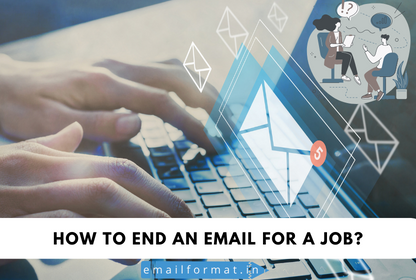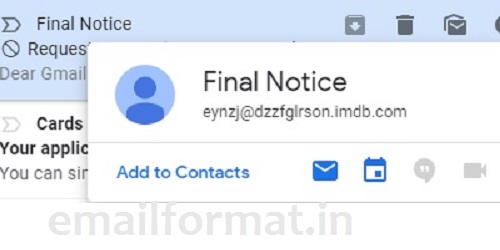How To End An Email For A Job?
An effective email closing not only ends the conversation in a professional, polite, and friendly manner, but it can also motivate the recipient to respond quickly, or even at all. Follow these simple steps when creating your email signoff.
Make a closing statement
The ending of an email should always express gratitude and indicate the type of response you're hoping for. You could, for example, say, "Thank you for your time and consideration." I eagerly await your response.
Take into account the situation and your relationship with the recipient.
The appropriate signoff is largely determined by the situation and the nature of your relationship with the other person. Professional correspondence requires more structure and decorum than, say, an email to a close friend.
Select an appropriate closing
Context clues can assist you in determining the appropriate tone. You can certainly mirror the recipient's tone after you've been emailing back and forth for a while and feel that a more casual signoff would be appropriate. When in doubt, a more professional signoff is always a good bet.
It's important to note that even if you've been exchanging emails for a while, you should always include an appropriate and thoughtful closing. Even if your correspondence has become more casual over time, including a signoff demonstrates professionalism and attention to detail, as well as making the messages easier to understand and follow. Furthermore, there's always the possibility that one of your messages will be forwarded to other members of the company, and a thoughtful and professional signoff will make a good impression on those individuals, especially if they've never communicated with you before.
Include your complete name
Including your first and last name is not only more professional, but it also prevents confusion about who you are. It's standard practise to include your full name in all professional emails, but it's especially important in the first few exchanges. Aside from avoiding confusion, this is also a good way to ensure that people, such as hiring managers, remember you.
Include your professional title
A title that represents your profession or area of expertise can be useful. This does not have to be your current job title, but it is an option if you prefer. If applicable and appropriate, include the name of the company for which you work. If you're applying for a job, just leave this out.
Include your contact information
Although the recipient already has your email address, it's a good idea to include a few other contact information, such as your work address, website URL, or direct phone number.
End An Email For A Job - Professional email signoffs
There are various ways to sign off on a professional email. When emailing a prospective employer or client, you should use a more formal closing, whereas when communicating with colleagues, you can be a little more casual. Here are some examples of more common professional email signoffs:
Warm Regards
- Another sign-off that divides experts is "Warm regards." This sign-off can be used to express gratitude without using the words "thank you." It demonstrates a level of comfort with the other person without crossing any boundaries.
While this is an acceptable sign-off, some experts advise against using it until you've established a relationship with the recipient. Others, however, argue that this sign-off is never appropriate in business emails and may be perceived as "fake" if the recipient believes you are not a particularly "warm" person.
Thank You
- Variations like Thanks, thank you, thank you again, many thanks can be used. People enjoy being thanked, so when in doubt, use this as your default. Any variation of "thank you" demonstrates that you value your reader's time in reviewing your job application, interviewing you, or connecting you with someone in their network.
Best Regards
- This email signature is a little more formal than its sibling "best," but it works just as well. When emailing a potential employer for the first time, use "best regards," and then switch to "best."
Looking Forward
- This email signature serves a purpose. For example, if a hiring manager contacts you and wants to schedule an interview, you can sign off your email with "looking forward." It not only demonstrates your optimism, but it also conveys the idea that you will contact me again in the future.
Best Wishes
- "Best wishes," like "best regards," is a little more formal than some of the other sign-offs and is what Reynolds recommends you use when you've never met someone. You can use "best" instead of "best regards" once you've established a relationship with the recipient.
Sincerely
- "Sincerely" comes across as stiff and old-fashioned. However, when it comes to safe and non-offensive sign-offs, you can't go wrong with "sincerely."
Let's look at the job application email sample.
Dear Mrs. Anthony,
I have 5 years of experience as a Software Developer at Mphasis, but when I saw that there was an opening at NICE, I applied right away because your company has a stellar reputation for developing new and innovative software.
I worked at Mphasis after graduating with a Master's Degree in Computer Science, where I have been since leaving university. I designed and programmed the engineering software used by retailers in UK.
For your consideration, I have enclosed my resume, cover letter, and educational certificates. I would be delighted to discuss this position with you further, and I hope to hear from you soon regarding this application.
Yours Sincerely,
[Your name]
Express Gratitude
Always thank the recipient for their time and consideration. A simple line like "Thank you for considering my application" shows respect and professionalism. Gratitude leaves a positive impression and reinforces your interest in the opportunity, no matter the outcome of your application.
Include a Call to Action
Ending with a clear, polite call to action helps guide the reader. Mention your availability for an interview or willingness to provide more information. This shows initiative and lets the employer know you’re ready to take the next step in the hiring process.
Choose a Professional Sign-Off
Use a professional and respectful closing like "Sincerely," "Best regards," or "Thank you." Avoid casual sign-offs such as "Cheers" or "Take care" in formal job emails. Also, include your full name and contact information if not already shared earlier in the email.
There are numerous professional email sign-offs a job seeker can use when communicating with recruiters or a prospective employer. After putting in the time and effort to make your job application the best it can be, make sure you end it on the right note to achieve job search success!




